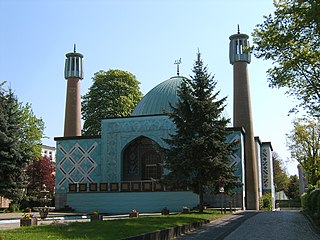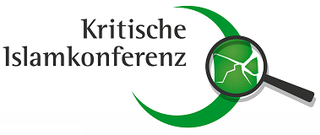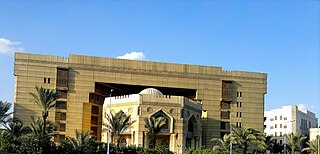
Islam's significance in Germany has largely increased after the labour migration in the 1960s and several waves of political refugees since the 1970s.

The Islamic Centre Hamburg, also known as the Blue Mosque, was the oldest mosque in Hamburg, Germany, being established in the late 1950s by a group of Iranian emigrants and business people and built in the early 1960s. Amid investigations regarding its ties with Iran and Hezbollah, the IZH was judged unconstitutional and closed by the German government in July 2024.

The Presidency of Religious Affairs is a state institution established in 1924 by Mustafa Kemal Atatürk. Initially created to manage religious duties previously overseen by the Shaykh al-Islām during the Ottoman Empire, it later gained formal recognition under Article 136 of the Turkish constitution. The president of the Diyanet, appointed by the president of Turkey, serves as the Grand Mufti of Turkey. This role is supported by a 16-member council elected from among clerics and university theology faculty.

Islam in Austria is the largest minority religion in the country, practiced by 7.9% of the total population in 2016 according to the Austrian Academy of Sciences. The majority of Muslims in Austria belong to the Sunni denomination. Most Muslims came to Austria during the 1960s as migrant workers from Turkey and Yugoslavia. There are communities of Arab and Afghan origin as well.

Ralf König is one of the best known and most commercially successful German comic book creators. His books have been translated into many languages. He has resided in Soest, Dortmund and Berlin and now lives in Cologne.

Berlin Mosque in Berlin is situated on Brienner Straße 7-8 in Berlin-Wilmersdorf. It was designed by K. A. Hermann and was built between 1923 and 1925. Berlin Mosque, which has two 27-metre-tall (90 ft) minarets, was heavily damaged in World War II. The two minarets were rebuilt in 1999/2001.
The Central Council of Ex-Muslims is a German association (Verein) advocating for the rights and interests of non-religious, secular persons of Muslim heritage who have left Islam. It was founded on 21 January 2007 and as of May 2007 had about 200 members, with "hundreds" of membership applications yet to be processed.

Necla Kelek is a Turkish-born German feminist and social scientist, holding a doctorate in this field, originally from Turkey. She gave lectures on migration sociology at the Evangelische Fachhochschule für Sozialpädagogik in Hamburg from 1999 until 2004.

Khadija Mosque is a mosque located in Heinersdorf, Pankow, Berlin, Germany. It is property of the Ahmadiyya Muslim Community, and the first mosque in former East Germany, opening on 16 October 2008. The mosque has a 12-metre-high (39 ft) minaret and has capacity for 500 worshippers. The mosque was financed by funds collected by Ahmadiyya women and the design was done by the architect Mubashra Ilyas.

Women's mosques exist around the world, with a particularly rich tradition in China. As Islam has principles of segregating the sexes at times, many places of worship provide a dedicated prayer space for women within the main building, but in a few countries, separate buildings were constructed. In some cases, women were allowed to become imams.
More than 60 percent of Berlin residents have no registered religious affiliation. As of 2010, at least 30 percent of the population identified with some form of Christianity, approximately 8.1 percent were Muslim, 1 percent were Jewish, and 1 percent belonged to other religions. As of 2022, the number of registered church members has shrunk to 15 percent for EKD Protestants and 9 percent for Catholics.

Farid Hafez is an Austrian political scientist and teaches International Relations at William and Mary. Before, he was the Class of 1955 Distinguished Visiting Professor of International Studies at Williams College. Since 2017, he has also been senior researcher at Georgetown University's The Bridge Initiative.
The Zürich Islamic center shooting occurred on 19 December 2016 in the Zürich Islamic Center in central Zürich. Three people were injured when a gunman opened fire in the center, though all survived. The perpetrator, who had stabbed a former friend to death the day prior to the shooting, died by suicide after fleeing the scene.

The Ibn Rushd-Goethe Mosque is the only self-described liberal mosque in Germany. It was inaugurated in June 2017, and is named after medieval Andalusian-Arabic polymath Ibn Rushd and German writer and statesman Johann Wolfgang von Goethe. The mosque was founded by Seyran Ateş, a German lawyer and Muslim feminist of Kurdish descent. The mosque is characterised as liberal; it bans face-covering, it allows women and men to pray together, and it accepts LGBT worshippers.

The Party of Humanists is a minor political party in Germany that first participated in the 2017 federal election. It is considered left-of-centre and supports socially liberal and secular policies, such as a federal European state, openness towards technologies such as stem cell research and strict separation between state and religion. The party contested the 2017 and 2021 federal elections, the 2019 European elections and numerous state elections from 2018 onwards. It also contested the 2024 European Parliament election in Germany.
This is a list of individual liberal and progressive Islamic movements in Europe, sorted by country. See also Islam in Europe and Euroislam.

The Kritische Islamkonferenz or KIK is an irregular organised event in Germany, which was conceived to be the critical counterpart to the Deutsche Islamkonferenz. Its first edition took place in 2008 in Cologne, where it was co-hosted by the Central Council of Ex-Muslims and the Giordano Bruno Foundation. The second edition was held in Berlin in 2013.

Al-Azhar al-Sharif is an Islamic scientific body and the largest religious institution in Egypt. Its headquarters is located in the building of the Sheikhdom of Al-Azhar in the center of the Egyptian capital, Cairo. The history of the establishment of the Al-Azhar Mosque dates back to the year 970 by the Fatimid Caliph Al-Muizz Li-Din Allah.

Duisburg Cathedral Mosque is the largest mosque in Germany. Located in the city of Duisburg in the west of Germany, a building with a Silver dome 23 meters high and a minaret 34 meters high. The mosque has a community center and a religious school. The initiator of the mosque in Duisburg was the local Muslim community.















